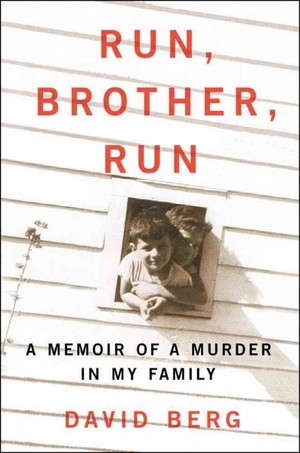Talking to David Berg: A Brother and his Book
June 28, 2013, by Inprint Staff
 Last Friday, Brazos Bookstore was packed as Houston lawyer David Berg read from his new book Run, Brother, Run: A Memoir of a Murder in My Family. The standing-room-only crowd listened intently as David read the foreword and took questions from the audience. The memoir focuses on the murder of his brother Alan Berg by hit man Charles Harrelson (father of actor Woody Harrelson) in Houston in the late 60s.
Last Friday, Brazos Bookstore was packed as Houston lawyer David Berg read from his new book Run, Brother, Run: A Memoir of a Murder in My Family. The standing-room-only crowd listened intently as David read the foreword and took questions from the audience. The memoir focuses on the murder of his brother Alan Berg by hit man Charles Harrelson (father of actor Woody Harrelson) in Houston in the late 60s.
The memoir has been receiving significant local and national attention. The Houston Press recently included Berg in a story about “Houston’s Top 10 Authors” and the New York Times wrote, “What is remarkable about the book, though, is Mr. Berg’s writing. He elegantly brings to life the rough-and-tumble boomtown that was 1960s-era Houston, and conveys with unflinching force the emotional damage his brother’s death did to his family.”
We had the opportunity to catch up with David and ask him a few questions.
INPRINT: Could you talk about how you came to write this memoir after having kept this traumatic event in your life mostly a secret for so many decades? I imagine the process was incredibly difficult. Was it also in some ways therapeutic?
DAVID: With the book finished and a little perspective, I think I wanted to tell my brother’s story for a very long time but wasn’t conscious of it. For four decades I rarely talked about Alan and even less about how he died. Then, on vacation in the early nineties, I watched an astonishingly large flock of geese—so many that dusk turned dark—flying along paths that had been charted for them over millions of years and thought of how little choice they had about the direction they flew—and then I started thinking about Alan, and how much of his life, too, was predetermined, and maybe, too, his death. And all those memories came bursting through the barrier his violent death had created.
The process was not as difficult as it might appear because I love to write and have all my life. But there was one night in particular, while reading for the first time the accomplice murderer’s twelve page statement describing in detail the hours of my brother’s kidnapping and murder that proved very difficult—and I began sobbing and couldn’t stop. My wife called at that moment from out of town and asked if someone had died, and I told her yes. That was the first and only time I have cried over Alan’s death.
Was it therapeutic? When I finished the book I realized that much of my anger and all of my memories of Alan had disappeared onto those pages. I no longer hate his killer or the man who hired him to murder my brother. I am no longer haunted by Alan’s murder.
INPRINT: Which books or writers were models or influences for you in this project?
DAVID: It wasn’t just books and writers: my high school English teacher, Shirley Wiley, fabled among the many Houstonians she taught, wielded a vicious blue pencil, taught me to avoid cliché and—the well known rule—to say as much as possible with as few words as possible.
It wasn’t just books and writers: my high school English teacher, Shirley Wiley, fabled among the many Houstonians she taught, wielded a vicious blue pencil, taught me to avoid cliché and—the well known rule—to say as much as possible with as few words as possible.
There is a rhythm to my writing that I attribute to the poets I have read since adolescence, among them Auden, Yeats, Dylan Thomas, and that old anti-Semite, T.S. Eliot. There were also three books in particular that resonated with me and because they contained elements out of my own life, encouraged me to write my own. In the novella, A River Runs Through It a brother is murdered over a gambling debt, as was Norman Maclean’s in real life, very similar to what happened to Alan. And I realized while reading Tobias Wolff’s memoir, This Boy’s Life, that the brother he wrote about was Geoffrey Wolff, who wrote The Duke of Deception and that they, as Alan and I, had been divvied up at the time of their parents’ divorce, one each per parent.
INPRINT: What was the most exciting part of seeing this idea become a reality—of seeing the book into print? Most terrifying? Any comments on the publishing process?
DAVID: I wouldn’t say I was ever terrified but I was very concerned that my book would be treated only as a true crime thriller, although there is doubtless that element in it. So the most exciting moment in the process came when Colin Harrison, my soon-to-be editor, invited me to meet him at a bar on Sixth Avenue, and told me that Scribner, with all its credibility (and romantic meaning to an English major like me), wanted to buy my book. As to the publishing business, it is incredibly frustrating: Barnes & Noble refuses to stock or display books published by Simon & Schuster (which includes its imprint, Scribner) because of a dispute over pricing. As a result, books like mine are not displayed on the shelves of the biggest bookstore chain in the country.
INPRINT: Do you have plans to write another book? If so, what’s next?
DAVID: I do, but I don’t want to say so in this blog for fear my law partner will see it.

